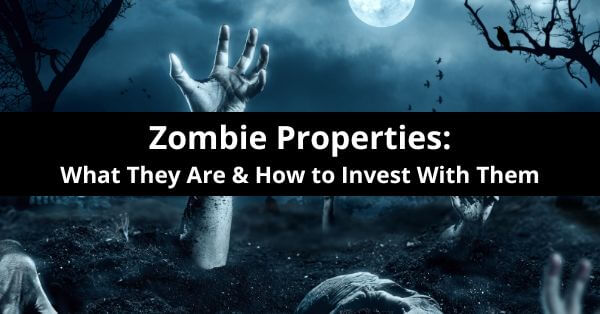Don’t worry – a zombie property has nothing to do with animated corpses. Instead, a zombie property is a home that is in limbo because the homeowner did not know they retained ownership and the property began to further deteriorate. In many cases this can be a gold mine for real estate investors, and also a great way for home buyers to get a good deal on a fixer-upper. But first, lets look at how a good home turns into a zombie property.
A zombie property happens when a bank or a lender starts the foreclosure process on a borrowers home, but never goes through with a full foreclosure. While this is happening, the homeowner makes an assumption that they have lost their home so they leave the property unaware it is still in their name. Many times the home will sit vacant, and because it was likely already in disrepair, it further degrades and becomes what we know as a “zombie property”.
Let’s “dig up” the advantages to buying zombie properties and why zombie properties sometimes can just be the walking dead.
The Advantages and Disadvantages to Buying Zombie Properties
Reasons you may want to buy zombie properties include:
- Rock bottom prices.
- Sellers are often motivated since they didn’t realize they still owned the property and they’ve moved on.
- Renovating properties in good neighborhoods can easily increase the market value which means more profits.
- Less competition if your market goes into bidding wars.
- The sale benefits everyone involved: the homeowner, the bank, the investor, and the neighborhood.
The downsides of investing in zombie properties include:
- Since the house has sat vacant, the property will have some deterioration or unsafe conditions that will need to be repaired.
- Windows and doors will need to be boarded up, locks keyed, and security systems/cameras should be installed until you can fix up the property to take care of any safety concerns with the property.
- All the legal details have to be dealt with, so these transactions may take longer.
How to Find Zombie Properties
To find zombie properties, check with:
- Mortgage lenders
- State and local authorities
- Title companies
- Property management companies
- Walk around neighborhoods
- Local tax authority
- Real estate agents
Zombie properties won’t have a for sale sign in the yard, so you’ll need to do a little detective work. And because you know the address of the zombie property, you can find out who owned it so you can contact them to make an offer, and also locate the groups involved during the last transaction like the title company and lender. Once you know this, you can begin buying zombie properties.
Things to Know Before Buying a Zombie Property
Buying a zombie property doesn’t have to be “scary”, but there are some “gory” details you’ll want to check for.
The first is to do a title search. You’ll be able to find out if there are liens on the property or obstacles that you’ll have to overcome before you invest both time and money into the property. The title search will also help you find the owner and lender so you can make an offer if everything checks out. Next is to have an inspection done. Some fixes and repairs are going to be needed, but the home inspection will check the “guts” and “bones” of the home which “animate” bigger problems.
The inspection may uncover cracked foundations, a rotting frame, or roof replacements. If these won’t be in your budget, the zombie property won’t be for you. If everything checks out, then you may have found the perfect home. And that is when you can contact the owner and make an offer.
Pro-tip: If the owner cannot sell you the zombie property outright, try having them deed it to you through a quit claim deed. If you can’t find the owner, you may need to pursue litigation to get the property title free and clear in a quiet title action.
The “cure” for zombie properties is a new owner who can revive it. Many have good “bones” and just need some TLC. If you’re looking for investment properties or to save some money when the market is skyrocketing, zombie properties may be the right solution for you.

